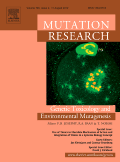
MUTATION RESEARCH-GENETIC TOXICOLOGY AND ENVIRONMENTAL MUTAGENESIS
Scope & Guideline
Elevating the discourse on toxicology and environmental genetics.
Introduction
Aims and Scopes
- Genotoxicity Assessment:
The journal emphasizes the evaluation of genotoxic effects of various agents, including chemicals, radiation, and environmental pollutants, through in vitro and in vivo studies. - Mechanisms of DNA Damage:
Research on the molecular and cellular mechanisms underlying DNA damage and repair processes, including oxidative stress and the role of various signaling pathways. - Environmental and Occupational Health:
A significant focus on the impacts of environmental and occupational exposures on genetic integrity, with studies examining populations exposed to pollutants, pesticides, and industrial chemicals. - Innovative Methodologies:
The journal encourages the development and application of novel methodologies for assessing genotoxicity, including advanced imaging techniques and biomarker studies. - Interdisciplinary Approaches:
MUTATION RESEARCH promotes interdisciplinary research that combines toxicology, genetics, and environmental science to address complex questions related to mutagenesis.
Trending and Emerging
- Impact of Air Pollution:
There is an increasing focus on the effects of air pollution on genetic integrity, with studies linking urban industrial emissions to mutagenesis and chromosomal aberrations in human populations. - Nanotoxicology:
Research into the genotoxic effects of nanoparticles and nanomaterials is gaining traction, highlighting concerns over their widespread use and potential health impacts. - Biomarkers of Genotoxicity:
The use of biomarkers for assessing exposure and effects of genotoxic agents is becoming more prominent, with studies employing advanced techniques to detect molecular changes. - Mechanisms of Aging and Genotoxicity:
Emerging research explores how aging influences susceptibility to genetic damage, indicating a growing interest in the intersection of gerontology and genetic toxicology. - Chemical Mixtures and Synergistic Effects:
There is a notable trend towards studying the effects of chemical mixtures and their cumulative genotoxic potential, reflecting the complexity of real-world exposures.
Declining or Waning
- Traditional Toxicology Assessments:
There is a noticeable decrease in studies relying solely on traditional in vitro assays without integration of newer technologies, such as high-throughput screening or omics approaches. - Research on Non-Chemical Mutagens:
Papers focusing on non-chemical mutagens, such as biological agents or physical mutagens (e.g., UV radiation), have become less frequent, possibly overshadowed by chemical and environmental toxicology. - Generalized Epidemiological Studies:
Epidemiological studies that do not specifically link genetic toxicity to environmental or occupational exposures are appearing less frequently, indicating a shift toward more targeted research. - Historical Comparisons:
There seems to be a waning interest in historical comparison studies of genotoxicity across different time periods, as the focus shifts to contemporary and real-time exposure assessments.
Similar Journals

TOXICOLOGY
Fostering dialogue and innovation in toxicological research.TOXICOLOGY, published by Elsevier Ireland Ltd, is a prestigious peer-reviewed journal specializing in the field of toxicology. With an ISSN of 0300-483X and an E-ISSN of 1879-3185, this journal provides a vital platform for researchers, professionals, and students to disseminate and access groundbreaking studies from 1973 to present, with a convergence set until 2024. Recognized for its high impact, it holds a Q1 ranking in Toxicology category and ranks #18 out of 133 in Scopus's sector of Pharmacology, Toxicology, and Pharmaceutics, placing it in the 86th percentile. While the journal is not open access, it nonetheless offers a rich collection of research articles that enhance the understanding of toxicological science and its applications. The journal's objectives encompass advancing knowledge in the toxicological evaluation of substances, promoting safety in public health, and fostering dialogue among scholars. As a key resource in the field, TOXICOLOGY plays a crucial role in advancing research and informing practices related to toxicological risks and safety assessments.

Environnement Risques & Sante
Exploring the Nexus of Environment and HealthEnvironnement Risques & Sante is a prominent journal focused on the intersection of environmental issues, public health, and safety, offering a platform for scholarly discourse on the critical challenges posed by environmental risks to human health. Published by JOHN LIBBEY EUROTEXT LTD, this journal aims to disseminate impactful research that enhances our understanding of toxicology, mutagenesis, and their implications for public health policy and practices. Though it ceased coverage in Scopus in 2021, its historical contributions remain relevant, addressing urgent topics in environmental science and occupational health. Researchers and professionals engaged in these fields will find valuable insights and findings that inform practice and promote sustainable solutions. For interested readers, further exploration of the journal can provide essential knowledge in coping with contemporary environmental health challenges.

MUTATION RESEARCH-FUNDAMENTAL AND MOLECULAR MECHANISMS OF MUTAGENESIS
Connecting Research to Real-World ImplicationsMUTATION RESEARCH - FUNDAMENTAL AND MOLECULAR MECHANISMS OF MUTAGENESIS is a premier peer-reviewed journal published by Elsevier, dedicated to advancing the understanding of mutagenesis and its broader implications in genetics, health, and molecular biology. With an impressive converged publication history from 1964 to 2024, this journal provides a vital platform for the dissemination of high-quality research findings, contributing significantly to the field's knowledge base. Indexed in Scopus, it holds a Category Quartile ranking of Q3 in Genetics and Q2 in Health, Toxicology, and Mutagenesis, further underscoring its relevance and stature. Access options are available, catering to a diverse audience of researchers, professionals, and students eager to stay informed on the latest developments in mutagenesis research. By bridging experimental studies and theoretical frameworks, the journal plays a crucial role in exploring the fundamental mechanisms underlying genetic mutations and their effects on human health and the environment.

Epigenomes
Bridging Disciplines to Unravel Epigenetic MysteriesEpigenomes is a distinguished open access journal published by MDPI, dedicated to advancing the field of epigenetics and its interdisciplinary connections to biochemistry, genetics, and molecular biology. Since its inception in 2017, this journal has provided a transparent platform for researchers to share their findings, contributing to a deeper understanding of epigenetic mechanisms and their implications in health, toxicology, and mutagenesis. Ranked in the Q2 quartile across multiple categories, including biochemistry and genetics, Epigenomes is recognized for its scholarly contributions, reflected in its notable Scopus rankings. Readers benefit from a wealth of open access articles, fostering innovation and collaboration within the academic community. With its headquarters in Switzerland and an unwavering commitment to scientific rigor, Epigenomes is positioned as a vital resource for researchers, professionals, and students seeking to deepen their insights into the epigenomic landscape.
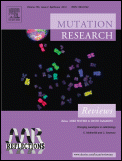
MUTATION RESEARCH-REVIEWS IN MUTATION RESEARCH
Elevating Knowledge in Health and Genetic MutationsMUTATION RESEARCH-REVIEWS IN MUTATION RESEARCH, published by Elsevier, stands as a premier journal in the fields of Genetics and Health, Toxicology and Mutagenesis, boasting a Q1 ranking in both categories for 2023. With an impressive impact factor and rigorous peer-review process, this journal serves as a vital platform for disseminating cutting-edge research and comprehensive reviews regarding the implications of genetic mutations and related health effects. Established in the Netherlands, it has evolved from its inception in the early 1990s to become an essential resource for researchers, professionals, and students alike, facilitating advancements in the understanding of mutation research. Despite not offering an open-access model, the journal ensures a wide reach through institutional subscriptions, emphasizing its commitment to fostering scholarly dialogue and promoting significant findings within the scientific community.

CHEMICAL RESEARCH IN TOXICOLOGY
Transforming toxicological research into public health advancements.Chemical Research in Toxicology is a premier journal published by the American Chemical Society, dedicated to advancing the understanding of toxicological effects associated with chemical substances. Since its inception in 1988, this esteemed journal has maintained a robust impact factor, ranking in the Q1 quartile for both Medicine (miscellaneous) and Toxicology as of 2023, reflecting its significance and influence in the fields of pharmacology and toxicology. With an impressive Scopus ranking at #16 out of 133 in the Toxicology category, it serves as a vital resource for researchers, professionals, and students seeking cutting-edge insights and scholarly articles that bridge the gap between chemistry and toxicological science. Although not an open-access publication, it continues to provide comprehensive analyses and original research that inform safe chemical practices and regulatory policies, further enhancing its role in public health and safety.
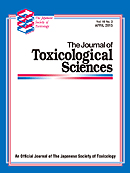
JOURNAL OF TOXICOLOGICAL SCIENCES
Fostering Collaboration in Toxicological ResearchThe Journal of Toxicological Sciences, published by the Japanese Society of Toxicological Sciences, is a prominent academic journal dedicated to the comprehensive study of toxicology and its related fields. Since its inception in 1976, the journal has provided a vital platform for researchers and professionals to disseminate innovative findings and insights in toxicology, with a focus on both experimental and clinical studies. Positioned in the Q3 quartile across various relevant categories, including Medicine (miscellaneous) and Toxicology as of 2023, the journal plays an essential role in advancing our understanding of toxic substances and their effects on biological systems. Although currently not open access, the journal maintains high academic standards and is indexed in Scopus, ranking #96 in Toxicology. Offering unique perspectives from Japan, it encourages global collaboration and discourse among toxicologists, making it an invaluable resource for students, researchers, and industry professionals alike.
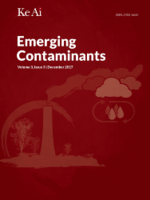
Emerging Contaminants
Advancing knowledge on novel pollutants.Emerging Contaminants is a leading international journal dedicated to the exploration and analysis of novel pollutants, their effects, and the methodologies for their detection and remediation. Published by KEAI PUBLISHING LTD in China, this Open Access journal has been at the forefront of scientific discourse since its inception in 2015, allowing unrestricted access to cutting-edge research. With an impressive categorization in the top Q1 quartile across diverse fields, including Health, Toxicology and Mutagenesis, and Public Health, it ranks remarkably high—41st out of 665 in Public Health and 10th out of 133 in Toxicology according to Scopus metrics, demonstrating its vital role in advancing our understanding of environmental health risks. By bridging the gap between academia and practical applications, Emerging Contaminants not only enriches the scientific community but also serves as an essential resource for policymakers and industry leaders seeking effective solutions to environmental challenges. Researchers, professionals, and students alike are encouraged to engage with the journal’s comprehensive studies and findings, contributing to a sustainable future.
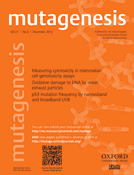
MUTAGENESIS
Leading the charge in mutagenesis research since 1986.MUTAGENESIS, published by Oxford University Press, is a leading journal in the fields of genetics, toxicology, and health, dedicated to advancing our understanding of mutagenic processes and their implications for human health. With an ISSN of 0267-8357 and an E-ISSN of 1464-3804, this journal has been at the forefront of mutagenesis research since its inception in 1986 and will continue to publish cutting-edge studies until 2024. Holding an impressive position in the academic community, MUTAGENESIS is ranked Q2 in Genetics, Q2 in Clinical Genetics, Q2 in Health, Toxicology, and Mutagenesis, and Q1 in Toxicology, reflecting its commitment to high-quality scholarly work. The journal enjoys a robust global readership, with significant rankings in various Scopus categories, including top positions in Environmental Science and Clinical Genetics, ensuring that it remains a vital resource for researchers, professionals, and students alike. While access to its articles is not completely open, MUTAGENESIS provides valuable insights that fuel innovative research and drive forward the understanding of genetic risks and toxicological assessments.
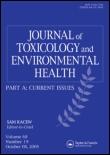
JOURNAL OF TOXICOLOGY AND ENVIRONMENTAL HEALTH-PART A-CURRENT ISSUES
Unraveling the Complexities of Toxicology and HealthJOURNAL OF TOXICOLOGY AND ENVIRONMENTAL HEALTH-PART A-CURRENT ISSUES, published by Taylor & Francis Inc, stands as a key resource in the interdisciplinary field of toxicology and environmental health. Operating under the ISSN 1528-7394 and E-ISSN 1087-2620, this journal maintains a strong presence with a Q2 category ranking in Health, Toxicology and Mutagenesis and a Q3 ranking in Toxicology as of 2023. It aims to disseminate critical findings that address contemporary issues in toxicology and environmental health, emphasizing the implications of environmental agents on human health. The journal offers both subscription and open access options, making cutting-edge research accessible to a diverse readership. With coverage of key topics from 1998 to 2024, it is an essential platform for academics, professionals, and students seeking to stay at the forefront of environmental health sciences.